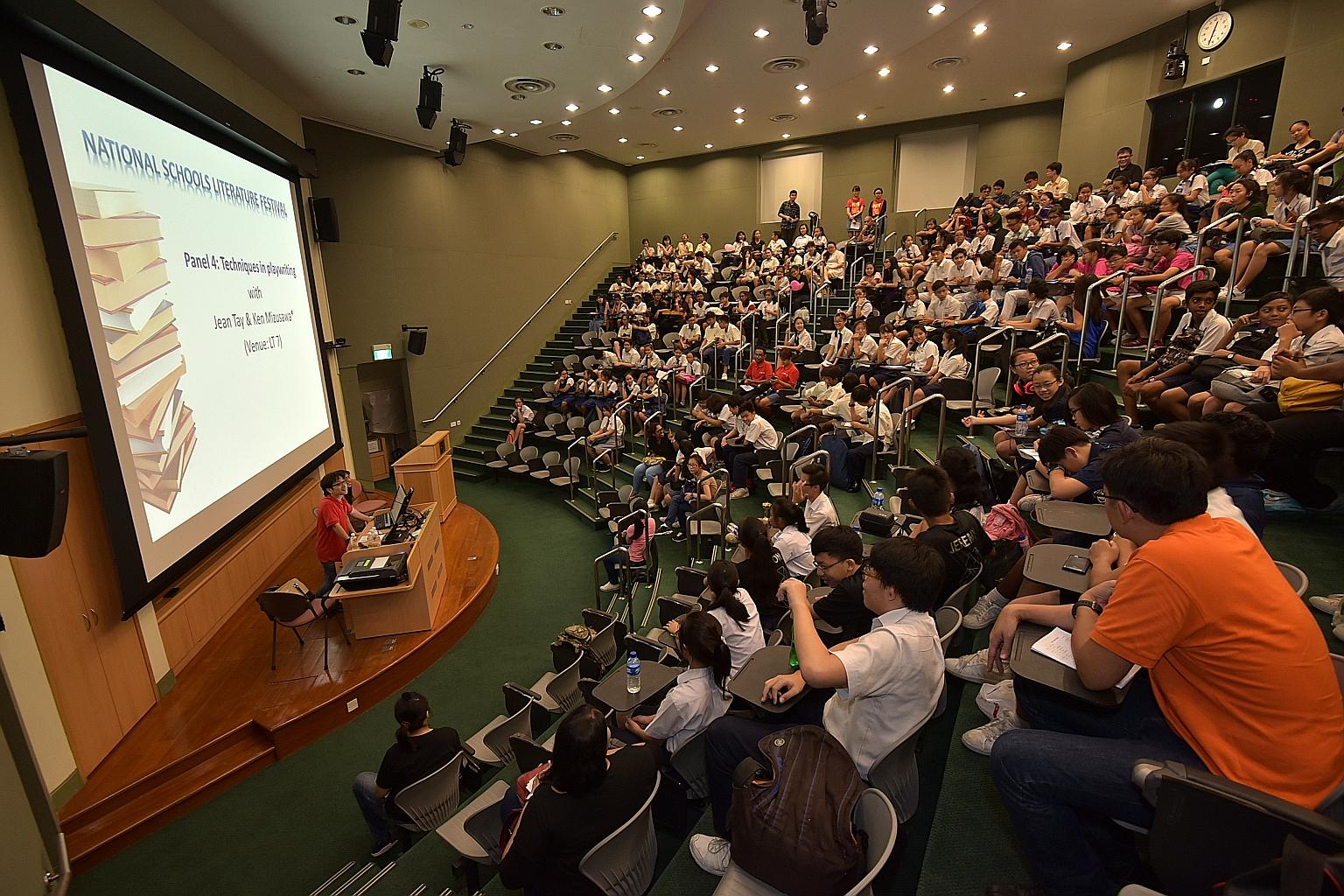Fewer Lit students a worrying trend
Lack of exposure to literature could have an impact on cultural development, say experts
Sign up now: Get tips on how to help your child succeed

Writers Jean Tay and Ken Mizusawa speaking about playwriting techniques at NIE last week. The number of students studying literature is falling but more schools seem to be offering the subject.
ST PHOTO: DIOS VINCOY JR
Fewer students are taking literature at the upper secondary level, pointing to fewer believing in its relevance, and raising concerns about the impact on cultural development here.
Last year, about 5,500 students sat the literature O-level examinations, down from about 6,000 students in 2012, according to figures from the Ministry of Education (MOE).
The drop came mainly from students taking literature as an elective - a "half subject" that is paired with another half subject, such as geography or history, and counted together as a whole subject.
Last year, about 3,100 students took the full literature exam while another 2,400 took the elective option at the O levels. In 2012, about 3,000 students sat each paper.
But while the number of students taking the subject is falling, the number of schools offering the subject appears to be on the rise.
Last year, more than 80 schools offered literature as a full subject, and over 50 schools offered it as an elective for the O levels. In 2013, about 70 offered it as a full subject, and about 50 taught it as an elective.
The issue of declining literature enrolment has generated interest in the arts and literary communities.
In May, the Institute of Policy Studies (IPS) launched a series of roundtable discussions with the Singapore Art Museum on cultural policy, beginning with one on literature education in schools.
A summary report on the discussion was made available on the IPS website last month.
IPS senior research fellow Tan Tarn How, who chaired the discussion, told The Straits Times that the state of literature education is tied to cultural policy, as the study of literature helps groom arts practitioners such as writers, playwrights and film-makers.
Said Mr Tan: "If we have so few students studying the subject, does it affect the number and the quality of practitioners, such as writers and playwrights, being produced? Who are the people who are able to do such work?"
At the closed-door discussion, Associate Professor Angelia Poon and Assistant Professor Suzanne Choo, both from the English Language and Literature Academic Group at the National Institute of Education (NIE), presented a paper discussing the factors that could have led to falling interest in literary studies in secondary schools.
They said part of the problem is that parents and students think the subject is difficult to score highly in, and that it has little practical value. The selection of texts is also unappealing to teens.
New Town Secondary School student Waynie Lee, 16, decided to take geography instead of literature as she found the subject "very difficult". She said: "We read Shakespeare's The Merchant Of Venice in Secondary 2 and it was so tough. I had to translate each page into modern English. I decided not to study literature after that."
Prof Choo analysed the O-level prescribed texts from 1990 to 2013 and found that excluding anthologies, 65 per cent of them were from authors originating in England, Ireland and the United States. Authors from Singapore made up 10 per cent of the texts, and those from Africa accounted for 14 per cent.
"The most frequently included author was William Shakespeare, who was also the only one to be included at least once for each year of the examination, followed by Arthur Miller," she said.
This has led to a lack of cultural representation, she added.
The prescribed list of texts for students sitting the literature exam next year includes titles such as William Golding's Lord Of The Flies, John Wyndham's The Midwich Cuckoos, and Shakespeare's Julius Caesar.
Of the 13 set texts, only two are local works - playwright Jean Tay's Everything But The Brain, and Here and Beyond: 12 Stories, an anthology of short stories edited by writer Cyril Wong.
The IPS report said many participants felt the list of prescribed texts could be updated and made more inclusive. It added that teachers tend to stick to "tried-and-tested" texts that previous batches of students did well in.
The IPS is preparing a full report on the issue, and will submit it next month to the relevant ministries, including MOE and the Ministry of Culture, Community and Youth.
Prof Poon said it is important for young people to study literature as it "encourages a deeper engagement, not only with language, but also with issues of socio-political and cultural import".
With Singapore aiming to be a global arts hub, Mr Tan said it is even more crucial that efforts are made to develop the country's own arts and literary scene.
"We will need, for example, writers, readers and people with some training in literature who will have an interest in this area," he added.
Cultural Medallion recipient and artistic director of theatre company The Necessary Stage Alvin Tan agreed. He said: "The reading capacity of the Singapore audience is not sophisticated, and it shows in their questions about our plays."
In February this year, he created an invitation-only Facebook group named LISS (Lit in Singapore Schools) to bring together people interested in discussing ways to revitalise literature in schools.
The group has 229 members, ranging from arts practitioners to teachers, who share reading materials and literature-related news.
He said: "Literature is an inter-related field to the work that I do, and it is close to my heart. We know there are issues such as falling literature enrolment, and I want to do something about it. The Facebook group is a way for us to discuss issues and generate awareness."


